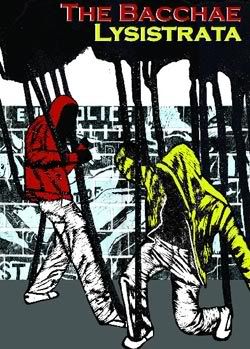
Lysistrata and The Bacchae
Lion and Unicorn Theatre
This evening, the Lion and Unicorn Theatre brings together two Greek plays, one comedy and one tragedy by two very different international directors. The first is Aristophanes' Lysistrata with director Kaitlin Argeaux updating the lascivious tale to modern street culture. The battling Athenians and Spartans are replaced by London Youth Gangs as Lysistrata, played by Ruth Kestenbaum, rallies woman-kind to withhold sexual pleasures from the male population until they agree to cease fighting and bring the Peloponnesian War to an end.
The production features contemporary dance and movement with hip-hop bump and grind being used to convey the sexual tensions. There is some very clever and well worked choreography by Justyna Scuotto and the ensemble routines are the highlight of the piece. Body slaps and taps are used to give the movement a keen sense of rhythm while the show is accompanied by dance music, created by Richard Hale (a.k.a. DJ Halo) who also plays the Magistrate.
Sadly the acting is rather uncompelling and the power of the language and its true comic potential are never found, many of their speeches being lost to the constant movement. However, the bold physicality provides some humorous scenes - especially memorable is the scene between sexually frustrated Cinesias,(Durassie Kiangangu) and his torturing wife Myrrhine played by Maria Gray. The performance culminates in a rap style epilogue providing a suitably modern but effective end.
For a show featuring so much rhythm and movement it is a shame that the lighting rig could not yield a more inventive design, some colour and sidelight could have transformed the dance sequences. A more experimental production, using dance interpretation of Lysistrata, could have made for a really interesting modern angle.
The second show of the evening, Euripedean tragedy The Bacchae, directed by Arlene Martinez-Vazquez, takes a very different form from the first. Embittered Dionysus, interestingly yet not altogether convincingly played by a woman, Amy Avery, seeks revenge on members of his family for refusing to believe he is a God. Dionysus' cult of worshippers tell the story through folk style singing and chanting that provides a good haunting overtone whilst puppets are used to represent Cadmus, Agave and Pentheus. The puppets are impressive and are well operated to reveal the emotion of the characters. However, the lack of live action in the piece presents a communication barrier and it is sometimes difficult to work out what is happening.
Ollie Fielding
Lysistrata and The Bacchae runs until 31st May





No comments:
Post a Comment